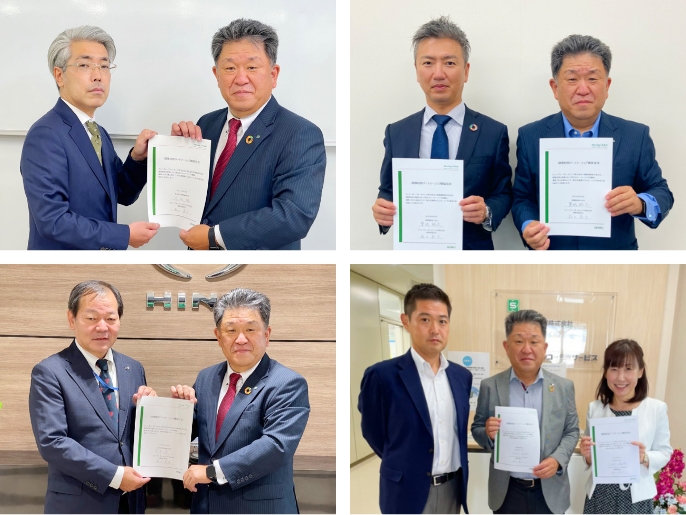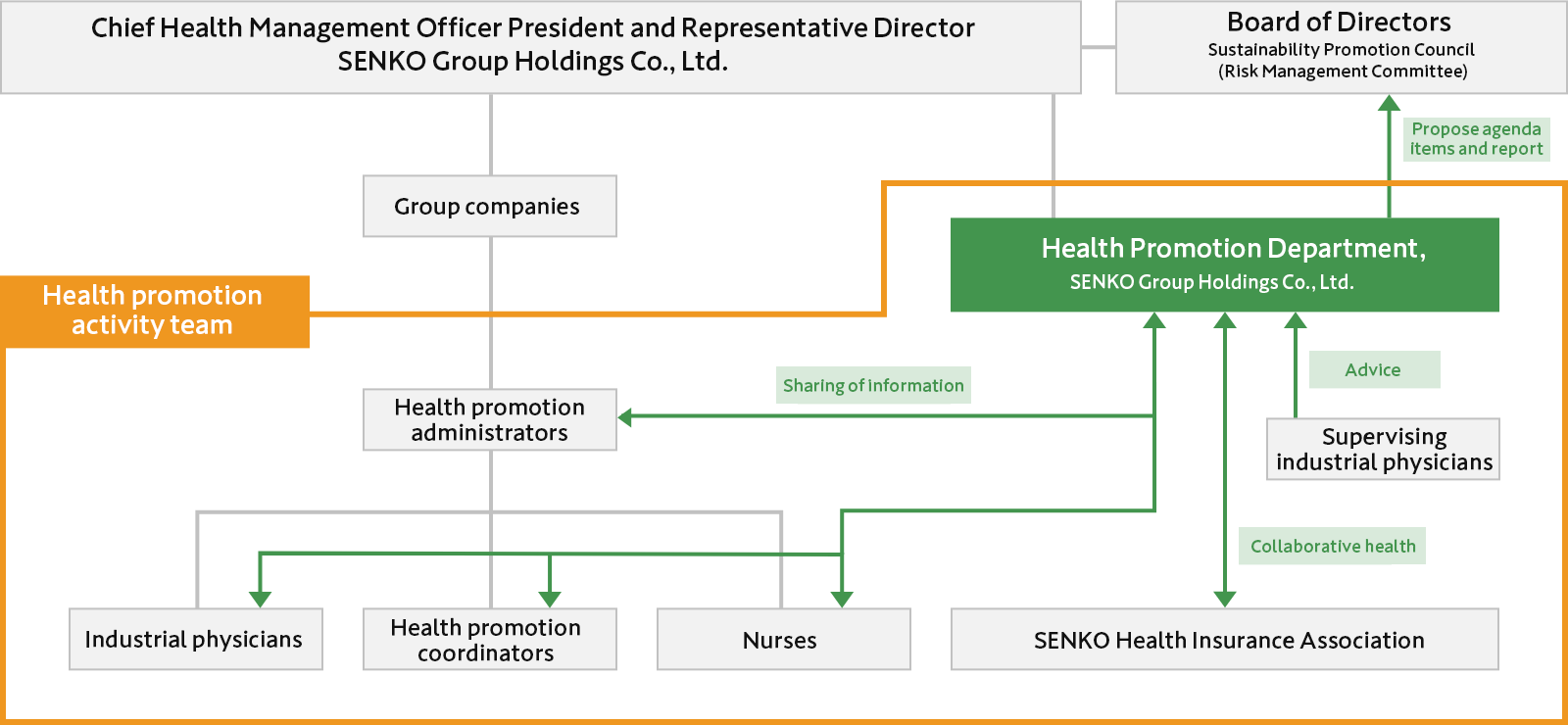SENKO HOLDINGS
Health Management System
Health management declaration
SENKO Group Holdings has identified ESG+H (health) management as a key priority under its Medium-Term Business Plan, and the company is working to realize the sustained growth of the Group by contributing to the realization of a sustainable environment and society. The SENKO Group practices health management, reflecting its belief that facilitating employee health is an essential part of ensuring business activities can proceed smoothly.
ESG+H Materiality (material factors)
Sustainable connections
-
Environment
- Climate change measures
- Circular economy
-
Social/Safety
- Diversity and inclusion
- Assurance of safety
- Responsible procurement structures
-
Governance
- Risk management
- Compliance
- Information disclosure
-
Health
- Infectious disease measures
- Management of employees' physical and mental health
To share the SENKO Group's health management values and policies as part of its implementation of health management and promote health-oriented activities throughout the Group, we announced the SENKO Group Health Management Declaration in 2017. The Health Management Declaration incorporates our wish that employees enjoy lifelong health and happiness, both while they work in a healthy and happy manner as employees and after they retire as working adults.

Promotional structures
Health management strategy
-
Health management initiative policy
We strive to create conditions that facilitate individual employees' mental and physical health and allow them to realize high performance while manifesting their individuality.
By practicing health management, we are working to improve employees' health literacy, lower health insurance co-pays, minimize situations where illness prevents employees from realizing the true level of performance of which they are capable, and boosting work engagement.
To that end, we will implement the PDCA cycle in health management by establishing numerical targets as health management outcome indicators, including work engagement and the prevalence of tobacco use and exercise, and evaluating and improving them on a regular basis.
-
Key health management issues
We have established, and are implementing, the following priority initiatives based on health diagnostics data, stress check group analysis results, and other data.
-
1. Improving health literacy
- Hosting line care seminars
- Hosting women's seminars
- Hosting adult-onset disease prevention seminars
-
2. Promoting and improving physical and mental health
- Carrying out planned activities to improve health in each geographic area of Japan
-
3. Improving work engagement (enthusiasm and energy)
- Maintaining and improving stress check participation
- Improving the workplace environment based on group analysis results
- Improving harassment knowledge
-
4. Strengthening the health management system
- Putting in place an environment that is conducive to strengthening health guidance
(Ensuring that we have put in place an environment conducive to online guidance and that employees' job responsibilities are taken into account) - Improving nursing education
(Making effective use of outside organizations and hosting meetings of experts) - Educating health promotion coordinators
(Encouraging participation in SENKO-planned educational seminars)
- Putting in place an environment that is conducive to strengthening health guidance
-
-
Health management strategy map
We have formulated a health management strategy map that illustrates the connections between management issues that the Group wishes to resolve through health management, employee health issues, and specific initiatives.
Specific health management initiatives
-
Hosting seminars
We host various seminars ever year, including women's seminars, adult-onset disease seminars, and line care seminars.
We offer women's seminars not only for women, but also for male managers as part of our effort to create an employee-friendly environment by helping participants deepen their understanding of women's health. Since the pandemic, we have streamed video from women's seminars to make it possible for more people to participate.
We offer line care seminars, a series of position-specific mental health seminars, for managers. By equipping them with accurate knowledge, we help prevent and quickly detect mental health issues.
-
Using the health management system to facilitate central management of health data
We have deployed a cloud-based health management system to facilitate the central management of an array of health data, including not only health checkup results, but also stress checks, interview records, and written opinions from industrial physicians. The system makes possible smooth operations in this area, including health data tabulation, information-sharing among nurses, and online interviews.
We believe pages for individual employees help improve health literacy by allowing workers to review their health checkup and stress check results at any time.
-
Carrying out health improvement activities
Each of the SENKO Group's companies, departments, and branches plans and carries out health improvement activities every year.
These activities, which include not only sports, but also cultural activities, are conceived to help boost employees' physical and mental health. Sporting events like walking, bowling, golf, volleyball, and tennis are popular, but there are also numerous interesting planned events that help spur communication among employees, for example beach seine fishing, jogging while picking up litter, and making pottery.

-
Building a health management system with expert input
Worksites nationwide employ a total of 28 (as of July 2023) industrial nurses (public health nurses and licensed nurses) who provide expert health guidance and support employees' physical and mental health. These personnel follow up on health checkup results and meet with individual employees to offer advice about mental health, providing key support for the creation of conditions that allow each and every employee to realize their full performance while boosting their physical and mental health and manifesting their individuality. The health management system allows the health of all Group employees to be managed at the same level of sophistication.
We periodically host regular meetings and study sessions, and we invite instructors to conduct knowledge training concerning industrial health as part of an effort to boost the skills of our nursing staff through the exchange of information and sharing of case studies.
Since 2020, we have also invited outside experts (university faculty members and industrial physicians) to serve as supervising industrial physicians charged with offering advice about the Group's health-related measures, allowing us to implement health management in a more effective manner.
Benefits of health management initiatives
-
Addressing health issues
We are dedicating resources to measures designed to combat adult-onset diseases since data detailing healthcare costs from the Health Insurance Association indicates that adult-onset diseases account for 45% of all outlays, and because the number of employees receiving specific examinations and health guidance is trending up with each passing year. Employees who are likely to develop adult-onset diseases (those with systolic blood pressure of 145 to 165, a BMI of 30 or greater, and smokers) are required to attend annual adult-onset disease prevention seminars. These seminars address the same topic–adult-onset diseases–but do so creatively each year to avoid repetition by approaching the subject from various perspectives, for example diet and exercise.
A survey following the FY2022 seminar indicated that 77% of participants were satisfied with the experience. One respondent noted that the experience provided new realization of the need to reevaluate habits by building on existing understanding of such diseases and the need to make improvements, and another expressed a desire to set goals and make improvements, highlighting how the seminar has improved literacy. Ongoing health guidance from SENKO's industrial nurses also yields improvements in checkup results, for example in terms of behavioral changes and measures of weight, body fat, and carbohydrate consumption, in 30% of participants. Going forward, we will continue these programs to keep adult-onset diseases from worsening.
Personal loss rates associated with presenteeism worsened from 8.6% in 2020 to 9.2% in 2021 due in part to the COVID-19 pandemic, but we believe that measures to prevent adult-onset diseases will help improve presenteeism in the future.
-
Benefits of measures addressing health issues specific to women
In order to address the health issues we wish to resolve through health management, for example to improve work engagement and reduce absenteeism and presenteeism, it will be essential to improve understanding of health problems that are unique to women. Increasing understanding of female diseases among female employees and improving support offered by managers are key priorities.
We have offered group training in the past for supervisors whose direct subordinates include female employees, but in 2021 we began offering training for all employees based on our belief that we need to put in place a workplace environment in which women can do their jobs with enthusiasm and peace of mind by ensuring that not only managers, but also all male employees understand health problems that affect women.
In 2021, we offered this training using an e-learning format due in part to the pandemic, and female and male employees accounted for 64% and 36% of 512 total viewings, respectively. In terms of age group, the data indicates that men in their 40s and 50s represented the largest group, and that managers actively viewed program content. Questionnaires administered before and after the e-learning program to investigate changes in literacy found improvement in all items.
The number of respondents indicating that they know that diseases specific to women vary by life stage rose 25.8%, while the number of respondents indicating that they know that problems related to menstruation and menopause can be treated by gynecologists rose 16.1%. The number of respondents who indicated that they are aware SENKO offers a hotline for questions about women's health problems* rose 37.9%.
*Working under the supervision of an industrial physician (gynecologist) with responsibility for women's health management, the SENKO Group has opened a consulting service concerning diseases specific to women with the goal of providing appropriate care to address health issues specific to women and offering support from a health perspective for the effort to build an environment in which female employees can prosper professionally.
Communication and third-party assessment of health management initiatives
-
Supporting supply chains
The SENKO Group practices health management. Recognizing the need to expand the scope of health management to include the Group's supply chains, we have working to build new partnerships to foster the implementation of health management and to encourage collaboration and cooperation.
During FY2023, we entered into a health management partnership with thinkrun Co., Ltd., and we are working to realize the well-being of both companies' employees.
Support includes not only introducing SENKO's health management activities, but also providing specific advice about topics such as how companies that have built health management partnerships can best embark on their health management journey.

 >
> - Sustainability >
- Health >
- Health Management System



